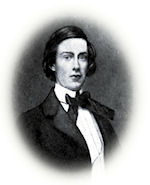July 9th.—Late last night the President told General Scott to send Captain Taylor back to the Confederate lines, and he was accordingly escorted to Arlington in a carriage, and thence returned without any answer to Mr. Davis’s letter, the nature of which has not transpired.
A swarm of newspaper correspondents has settled down upon Washington, and great are the glorifications of the high-toned paymasters, gallant doctors, and subalterns accomplished in the art of war, who furnish minute items to my American brethren, and provide the yeast which overflows in many columns; but the Government experience the inconvenience of the smallest movements being chronicled for the use of the enemy, who, by putting one thing and another together, are no doubt enabled to collect much valuable information. Every preparation is being made to put the army on a war footing, to provide them with shoes, ammunition waggons, and horses.
I had the honour of dining with General Scott, who has moved to new quarters, near the War Department, and met General Fremont, who is designated, according to rumour, to take command of an important district in the West, and to clear the right bank of the Mississippi and the course of the Missouri. “The Pathfinder” is a strong Republican and Abolitionist, whom the Germans delight to honour—a man with a dreamy, deep blue eye, a gentlemanly address, pleasant features, and an active frame, but without the smallest external indication of extraordinary vigour, intelligence, or ability; if he has military genius, it must come by intuition, for assuredly he has no professional acquirements or experience. Two or three members of Congress, and the General’s staff, and Mr. Bigelow, completed the company. The General has become visibly weaker since I first saw him. He walks down to his office, close at hand, with difficulty; returns a short time before dinner, and reposes; and when he has dismissed his guests at an early hour, or even before he does so, stretches himself on his bed, and then before midnight rouses himself to look at despatches or to transact any necessary business. In case of an action it is his intention to proceed to the field in a light carriage, which is always ready for the purpose, with horses and driver; nor is he unprepared with precedents of great military commanders who have successfully conducted engagements under similar circumstances.
Although the discussion of military questions and of politics was eschewed, incidental allusions were made to matters going on around us, and I thought I could perceive that the General regarded the situation with much more apprehension than the politicians, and that his influence extended itself to the views of his staff. General Fremont’s tone was much more confident. Nothing has become known respecting the nature of Mr. Davis’s communication to President Lincoln, but the fact of his sending it at all is looked upon as a piece of monstrous impertinence. The General is annoyed and distressed by the plundering propensities of the Federal troops, who have been committing terrible depredations on the people of Virginia. It is not to be supposed, however, that the Germans, who have entered upon this campaign as mercenaries, will desist from so profitable and interesting a pursuit as the detection of Secesh sentiments, chickens, watches, horses, and dollars, I mentioned that I had seen some farm-houses completely sacked close to the aqueduct. The General merely said, “It is deplorable!” and raised up his hands as if in disgust. General Fremont, however, said, “I suppose you are familiar with similar scenes in Europe. I hear the allies were not very particular with respect to private property in Russia”—a remark which unfortunately could not be gainsaid. As I was leaving the General’s quarters, Mr. Blair, accompanied by the President, who was looking more anxious than I had yet seen him, drove up, and passed through a crowd of soldiers, who had evidently been enjoying themselves. One of them called out, “Three cheers for General Scott!” and I am not quite sure the President did not join him.
![]()











